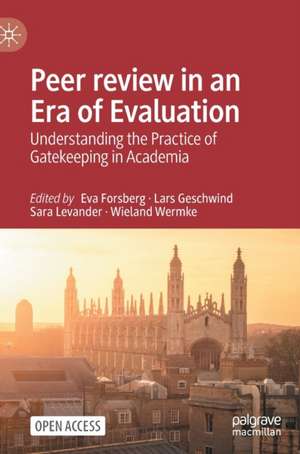Peer review in an Era of Evaluation: Understanding the Practice of Gatekeeping in Academia
Editat de Eva Forsberg, Lars Geschwind, Sara Levander, Wieland Wermkeen Limba Engleză Hardback – 4 ian 2022
This open access volume explores peer review in the scientific community and academia. While peer review is as old as modern science itself, recent changes in the evaluation culture of higher education systems have increased the use of peer review, and its purposes, forms and functions have become more diversified. This book put together a comprehensive set of conceptual and empirical contributions on various peer review practices with relevance for the scientific community and higher education institutions worldwide. Consisting of three parts, the editors and contributors examine the history, problems and developments of peer review, as well as the specificities of various peer review practices. In doing so, this book gives an overview on and examine peer review , and asks how it can move forward.
This is an open access book.Preț: 424.33 lei
Nou
Puncte Express: 636
Preț estimativ în valută:
81.21€ • 84.60$ • 67.52£
81.21€ • 84.60$ • 67.52£
Carte tipărită la comandă
Livrare economică 08-22 februarie 25
Preluare comenzi: 021 569.72.76
Specificații
ISBN-13: 9783030752620
ISBN-10: 3030752623
Pagini: 421
Ilustrații: XIX, 402 p. 19 illus.
Dimensiuni: 148 x 210 mm
Greutate: 0.66 kg
Ediția:1st ed. 2022
Editura: Springer International Publishing
Colecția Palgrave Macmillan
Locul publicării:Cham, Switzerland
ISBN-10: 3030752623
Pagini: 421
Ilustrații: XIX, 402 p. 19 illus.
Dimensiuni: 148 x 210 mm
Greutate: 0.66 kg
Ediția:1st ed. 2022
Editura: Springer International Publishing
Colecția Palgrave Macmillan
Locul publicării:Cham, Switzerland
Cuprins
PART I – PEER REVIEW: INTRODUCTION AND ITS CONTEXT.- 1: The Scientific Community, Academia and Peer Review;Eva Forsberg, Lars Geschwind & Sara Levander.- 2: Hierarchies and Universal Inclusion in Scientific Communities; Rudolf Stichweh.- 3: Authors, peer review, and publications – a socio-historical constellation; Raf Vanderstraeten.- PART II – PEER REVIEW AND THE HIGHER EDUCATION EVALUATION MACHINERY.- 4: Performances and Gatekeepers: Quality assurance of education and research in Dutch higher education; Don F. Westerheijden.- 5: The many faces of peer review; Hanne Foss Hansen.- 6: How gatekeepers sometimes enhance the effects of evaluation machineries in research; Peter Dahler Larsen.- 7: Peer review in public administration: a contradiction in terms?; Agnes Ers & Kristina Tegler Jerselius.- PART III – SPECIFICITIES OF DIFFERENT PEER REVIEW PRACTICES.- 8: Is Peer Review Fit for Purpose?; Malcolm Tight.- 9: Peer advocacy – loyalties, wish lists and tough love in national peer review;Lars Geschwind.- 10: Many faces of scientific evaluation: use of public, professional and organizational power; Jonna Kosonen, Tea Vellamo, Taru Siekkinen & Elias Pekkola.- 11: Disciplinary boundary work - Peer-review and the (full) professorship; Eva Forsberg, Rita Foss Lindblad, Sara Levander & Sverker Lindblad.- 12: Assessing academic careers: Crafting the ‘excellent’ professor in biomedicine, economics and history; Björn Hammarfelt.- 13: Peer review in academic promotion – when teaching excellence is at stake; Maja Elmgren, Eva Forsberg, Sara Levander.- 14: Performance-based evaluation metrics – influence at the macro, meso and micro level; Gustaf Nelhans.- 15: The role of peer review in the evidence making processes of systematic review; Tine S. Prøitz & Magnus Levinsson.- Part IV – PEER REVIEW: A FINAL ACCOUNT.- Chapter 16: Peer review, an extended, challenged and migrating institution.
Notă biografică
Eva Forsberg is Professor of Education at Uppsala University, Sweden. Her research focuses education governance and evaluation, academic work and the interface between educational policy, practice and research.
Lars Geschwind is Professor in Engineering Education Policy and Management at KTH Royal Institute of Technology, Sweden. His main research interests are higher education policy, institutional governance, academic leadership and academic work.
Sara Levander is Senior Lecturer and Researcher in Education at Uppsala University, Sweden. Her research interests are higher education, academic work and faculty evaluation in academic recruitment and promotion.
Wieland Wermke is Associate Professor in Special Education at Stockholm University, Sweden. His research interest focuses on comparative education methodology, and teacher practice at different levels of education.
Lars Geschwind is Professor in Engineering Education Policy and Management at KTH Royal Institute of Technology, Sweden. His main research interests are higher education policy, institutional governance, academic leadership and academic work.
Sara Levander is Senior Lecturer and Researcher in Education at Uppsala University, Sweden. Her research interests are higher education, academic work and faculty evaluation in academic recruitment and promotion.
Wieland Wermke is Associate Professor in Special Education at Stockholm University, Sweden. His research interest focuses on comparative education methodology, and teacher practice at different levels of education.
Textul de pe ultima copertă
Eva Forsberg is Professor of Education at Uppsala University, Sweden. Her research focuses education governance and evaluation, academicwork and the interface between educational policy, practice and research.
Lars Geschwind is Professor in Engineering Education Policy and Management at KTH Royal Institute of Technology, Sweden. His main research interests are higher education policy, institutional governance, academic leadership and academic work.
Sara Levander is Senior Lecturer and Researcher in Education at Uppsala University, Sweden. Her research interests are higher education, academic work and faculty evaluation in academic recruitment and promotion.
Wieland Wermke is Associate Professor in Special Education at Stockholm University, Sweden. His research interest focuses on comparative education methodology, and teacher practice at different levels of education.
Lars Geschwind is Professor in Engineering Education Policy and Management at KTH Royal Institute of Technology, Sweden. His main research interests are higher education policy, institutional governance, academic leadership and academic work.
Sara Levander is Senior Lecturer and Researcher in Education at Uppsala University, Sweden. Her research interests are higher education, academic work and faculty evaluation in academic recruitment and promotion.
Wieland Wermke is Associate Professor in Special Education at Stockholm University, Sweden. His research interest focuses on comparative education methodology, and teacher practice at different levels of education.
Caracteristici
Explores peer review in the scientific community and academia Puts together a comprehensive set of conceptual and empirical contributions Gives an overview on and examines peer review , and asks how it can move forward Open Access
